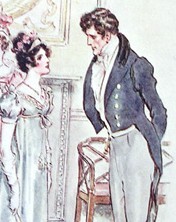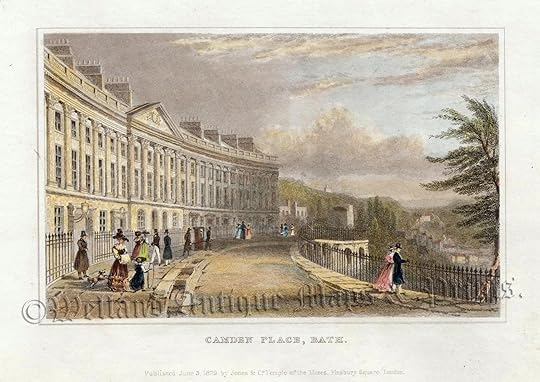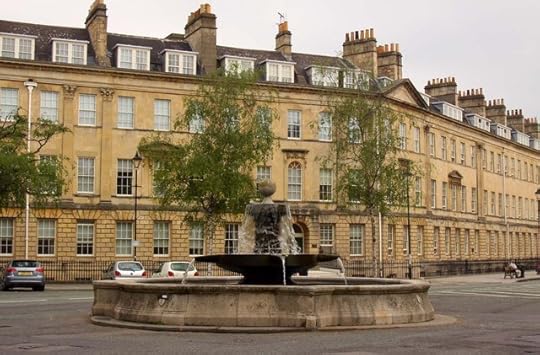The Readers Review: Literature from 1714 to 1910 discussion

This topic is about
Persuasion
2024/25 Group Reads - Archive
>
Persuasion 2024: Week 3: May 26-June 1: Vol 2, Ch 3-8
date newest »
newest »
 newest »
newest »
 I’m always struck, when reading this part of the book, by how limited a scope of action Anne has. (It’s a problem the Persuasion filmmakers wrestle with, and resolve in ways that really irritate me by making Anne boldly pursue Wentworth.) She’s always being trapped with her family or waiting to hear news about Wentworth and Louisa or being pushed into intimacy with Mr. Elliot or the Dalrymples against her will. At one point, she has to sit in the window of a sweet shop like a macaroon while Wentworth strides around Bath chatting with friends; the most she can do is sidle toward the door. All this passivity builds tension for sure, but was it really realistic, or a bit exaggerated for effect? I feel that at 27, she could be considered enough “on the shelf” to have exercised a little more personal freedom. I found myself muttering, “Just slap a lace cap on your head [to proclaim herself a spinster] and get out there, girl!” Her big rebellion is going to see Mrs. Smith instead of attending the Dalrymples’ party.
I’m always struck, when reading this part of the book, by how limited a scope of action Anne has. (It’s a problem the Persuasion filmmakers wrestle with, and resolve in ways that really irritate me by making Anne boldly pursue Wentworth.) She’s always being trapped with her family or waiting to hear news about Wentworth and Louisa or being pushed into intimacy with Mr. Elliot or the Dalrymples against her will. At one point, she has to sit in the window of a sweet shop like a macaroon while Wentworth strides around Bath chatting with friends; the most she can do is sidle toward the door. All this passivity builds tension for sure, but was it really realistic, or a bit exaggerated for effect? I feel that at 27, she could be considered enough “on the shelf” to have exercised a little more personal freedom. I found myself muttering, “Just slap a lace cap on your head [to proclaim herself a spinster] and get out there, girl!” Her big rebellion is going to see Mrs. Smith instead of attending the Dalrymples’ party.Also bothered a bit by how cartoonishly villainous and (and venial) her family is. I wonder if Austen would have tempered or qualified their characterizations if she had lived to revise this book. The scene in which Sir Walter mocks Anne’s friendship with Mrs. Smith is one that’s completely over the top, as well as Mary’s letter to Anne in which she announces Louisa’s engagement.
Speaking of the entitled snobs, there’s some curious triangulation in this section about class and merit, much of it centered on the words gratitude and gratification. We’re invited to despise Sir Walter and Elizabeth for chasing after their noble relations and for being so obviously gratified by the attention they get when in the Dalrymples’ company—signs of being valued without merit. We’re told, by Wentworth’s words and Anne’s actions, that by contrast there’s true worth and merit in having a good education and deploying it in ongoing learning.
Anne values her school friend Mrs. Smith for her qualities of mind, and she tells Mr. Elliot that she prefers “the fellowship of clever, well-informed people who have a great deal of conversation and a liberality of ideas.” Wenworth is dismissive about Louisa Musgrove—“I regard Louisa Musgrove as a very amiable, sweet-tempered girl, and not deficient in understanding”—but he views Captain Benwick as “something more”: “He is a clever man, a reading man.”
Yes, there’s a degree to which Wentworth in that scene is trying to signal to Anne that he isn’t, could never have been, in love with Louisa. But when I look at what they both value, I see merely a different kind of snobbery, a different way to gratify one’s vanity. They aren’t praising good character, self-sacrifice, or the exercise of virtue when faced with temptation; they’re praising the acquisition of cultural literacy and its use as entertainment. It’s just a different type of exclusive club from the one Sir Walter, Elizabeth, and Mary aspire to—and Anne is “gratified” (vol. II, chap. 8) that Wentworth has signaled she belongs to it (as well as when Mr. Elliot praises her for it, even though his hints about marriage repel her).
Meanwhile, there’s gratitude, which circles us back to Anne’s passivity. An influential book of the era, A Father’s Legacy to His Daughters by John Gregory, argued that a woman’s role in life precluded her from feeling real love; instead, she was relegated to feeling gratitude when a man chooses to love her. It’s taken for granted that propriety dictates that a woman should not betray her feelings until a man expresses his (when Charlotte Lucas says otherwise in Pride and Prejudice, Elizabeth Bennet assumes she’s joking). Austen often frames her heroines’ attachment to their heroes in terms of “gratitude and esteem.” The woman is not supposed to allow herself to love a man until given permission by expressions of his love for her, and then she’s only supposed to be grateful for the favor he shows.
Wentworth flips this norm on its head a bit when he says that he’d understand Benwick’s attachment to Louisa better if it started in gratitude for her showing signs of attachment to him. But where does that leave Anne, who has been (albeit silently) signaling her love for Wentworth all the while he’s ignoring her? Her response, when he finally shows signs of attachment in this section, is not gratitude but gratification—perilously close to the satisfied vanity displayed by her family members.
My point is that maybe if she’d had time to rethink, Austen wouldn’t have undercut her own narrative quite so badly.
Abigail wrote: "They aren’t praising good character, self-sacrifice, or the exercise of virtue when faced with temptation; they’re praising the acquisition of cultural literacy and its use as entertainment. It’s just a different type of exclusive club from the one Sir Walter, Elizabeth, and Mary aspire to—and Anne is “gratified” (vol. II, chap. 8) that Wentworth has signaled she belongs to it (as well as when Mr. Elliot praises her for it, even though his hints about marriage repel her)."
I think that, at least within their circle of those with access to education and books, to honour those who chose to read and think about and discuss serious topics in conversation, rather than spend their time beautifying themselves, gossiping, or perusing Debrett's is no different than honouring those who choose to be kind or virtuous. Even for Wentworth to say that "this is what I (and presumably Benwick) find attractive" is no more snobbish than a man who says he wants a wife who is beautiful or who will want to go on long walks in the country or will enjoy going to the theatre with him. It is simply reflecting his own taste. He is choosing intelligence and the desire to make something of it. Presumably it is also a way for Austen to give the first hint to Anne that perhaps Frederick is still attracted to her, so moves the plot along. (Not to mention subtly flattering her readers for being readers)
I do agree that there could have been improvements if Austen had had time to rewrite (and yes toning down the sheer awfulness of Mary and perhaps of the other Elliots might have happened) but I think one of Austen's overriding themes is attractive men who choose a woman based on more than her beauty.
I think that, at least within their circle of those with access to education and books, to honour those who chose to read and think about and discuss serious topics in conversation, rather than spend their time beautifying themselves, gossiping, or perusing Debrett's is no different than honouring those who choose to be kind or virtuous. Even for Wentworth to say that "this is what I (and presumably Benwick) find attractive" is no more snobbish than a man who says he wants a wife who is beautiful or who will want to go on long walks in the country or will enjoy going to the theatre with him. It is simply reflecting his own taste. He is choosing intelligence and the desire to make something of it. Presumably it is also a way for Austen to give the first hint to Anne that perhaps Frederick is still attracted to her, so moves the plot along. (Not to mention subtly flattering her readers for being readers)
I do agree that there could have been improvements if Austen had had time to rewrite (and yes toning down the sheer awfulness of Mary and perhaps of the other Elliots might have happened) but I think one of Austen's overriding themes is attractive men who choose a woman based on more than her beauty.
 As this section continued, I was surprised by how much Anne understood what Wentworth was feeling, and reacting to that. In previous reading (I was much younger) I had the sense of her wondering about his feelings and being passive because of her uncertainty.
As this section continued, I was surprised by how much Anne understood what Wentworth was feeling, and reacting to that. In previous reading (I was much younger) I had the sense of her wondering about his feelings and being passive because of her uncertainty. She has also come to realise that her William Elliot is insincere because he is all things to all men (and women!). This is, of course, in contrast to Captain Wentworth, who is consistent, and so universally liked.
The smallness and the restrictions of her life continue to chafe; the boredom at home is key, but the idea that Bath offers more enjoyable society outwith her domestic life is an important aspect here, I think.
 Abigail wrote: I feel that at 27, she could be considered enough “on the shelf” to have exercised a little more personal freedom. I found myself muttering, “Just slap a lace cap on your head [to proclaim herself a spinster] and get out there, girl!”
Abigail wrote: I feel that at 27, she could be considered enough “on the shelf” to have exercised a little more personal freedom. I found myself muttering, “Just slap a lace cap on your head [to proclaim herself a spinster] and get out there, girl!”Since her father and her older sister do not consider Elizabeth to be on the shelf, surely it would be impossible for Anne, as the younger sister, to do so herself?
 Old Scot wrote: "Abigail wrote: I feel that at 27, she could be considered enough “on the shelf” to have exercised a little more personal freedom. I found myself muttering, “Just slap a lace cap on your head [to pr..."
Old Scot wrote: "Abigail wrote: I feel that at 27, she could be considered enough “on the shelf” to have exercised a little more personal freedom. I found myself muttering, “Just slap a lace cap on your head [to pr..."I don’t think it’s a purely arithmetical calculation. Elizabeth believes herself to be as handsome as ever, and is “in society” to a much greater degree than Anne. Anne got only one London season and then was left at home. She is not the hostess and does not participate in many of the card parties. But no doubt Elizabeth would resent a younger sister starting to wear lace caps, so Anne might refrain out of desire for peace at home.
 Abigail wrote: "Old Scot wrote: "Abigail wrote: I feel that at 27, she could be considered enough “on the shelf” to have exercised a little more personal freedom. I found myself muttering, “Just slap a lace cap on..."
Abigail wrote: "Old Scot wrote: "Abigail wrote: I feel that at 27, she could be considered enough “on the shelf” to have exercised a little more personal freedom. I found myself muttering, “Just slap a lace cap on..."Yes, I was thinking of the family opposition to her doing such a thing. And would the prospect of giving up on ever leaving her family circle - the people in her life who have the least respect for her - play a psychological role?
 I think it is appropriate to mention here that Jane Austen lived in a very hierarchical society, in which for women differences in age and marital status, and for men occupation (or lack thereof) were important in ways we no longer take so much into account in most social settings. Also birth order, and not just the special status of an oldest son.
I think it is appropriate to mention here that Jane Austen lived in a very hierarchical society, in which for women differences in age and marital status, and for men occupation (or lack thereof) were important in ways we no longer take so much into account in most social settings. Also birth order, and not just the special status of an oldest son.Figuring out your standing in regards to someone else was a constant pre-occupation. It was normal, not a character flaw, to take such things into account, and act accordingly.
But it could easily be overdone. E.g., baronets weren’t all that important in the scheme of things, although definitely on the right side of gentility.
Ian wrote: "I think it is appropriate to mention here that Jane Austen lived in a very hierarchical society, in which for women differences in age and marital status, and for men occupation (or lack thereof) w..."
Yes and it's fascinating to me how much Austen appears to vary in what she is saying regarding this. Emma seems to be the most concerned with stratifying people into their various societal gradations (view spoiler), Pride and Prejudice seems to promote more mobility for women (view spoiler) and Persuasion supports men's social mobility through achievements.
Yes and it's fascinating to me how much Austen appears to vary in what she is saying regarding this. Emma seems to be the most concerned with stratifying people into their various societal gradations (view spoiler), Pride and Prejudice seems to promote more mobility for women (view spoiler) and Persuasion supports men's social mobility through achievements.
 Which is the odd one out - Devastation, Revelation or Resolution?
Which is the odd one out - Devastation, Revelation or Resolution? The answer is ‘Revelation’ because it was the only one of the three that was not a Royal Navy warship ( I hope I am right.) Nevertheless as we are talking fiction, it seems to be the HMS Revelation that we are sailing in during these chapters because all sorts of unexpected occurrences keep appearing in our gunsights.
I will deal with a couple of them. The dropping of Captain Wentworth by Louisa was not that unexpected. After all he literally dropped her. Ouch! It all turned sour for the Captain in Lyme. No wonder he kept well away after such a shocking event.
But the engagement of Louisa and Benwick was way off the radar (oops, sorry, they didn’t have radar then.) Was Emma Woodhouse in Lyme during Louisa’s convalescence? The engagement had all the hallmarks of her interference. I have to agree with the Captain that on the surface at least it seems that the betrothed couple were not at all suited to each other. Unless the bang on the head has changed Louisa’s personality, I can’t see her mooning around Benwick’s annotated Horace or copying out his Greek translations. Benwick himself has certainly shown his Byronic qualities in his swift switches of allegiance between women. For Louisa’s sake I hope that doesn’t continue.
Another startling revelation for me was the transformation of Anne from the woman no one cared about to the hottest property in Bath.
At one point at the concert I thought there might even be a fight between Elliot and Wentworth, or at least a bit of pushing and shoving. I imagined Anne getting gradually squashed as the two men sat on either side of her and edged almost imperceptibly closer.
The sea air in Lyme Regis must have done wonders for Anne’s complexion to encourage the whole of Bath to remark that she was even ‘prettier than her sister.’
And not a trace of ‘Gowlands’ despite her father’s disbelief.
http://hibiscus-sinensis.com/regency/...
Of course, Wentworth can now see beyond the ‘degradation’ he was appalled to witness when he first set eyes on her after so many years apart.
Anne thinks she has been able to see within the well tailored and well mannered exteriors of both men. Her deductions have made her extremely agitated……….
’ ’ Jealousy of Mr Elliot! It was the only intelligible motive. Captain Wentworth jealous of her affection! Could she have believed it a week ago; three hours ago! For a moment the gratification was exquisite. But, alas! there were very different thoughts to succeed. How was such jealousy to be quieted? How was the truth to reach him?’

(C. E. Brock)
Has Anne got it right or, like Lady Russell and the curtains, read the Captain all wrong? Could his greenish tinge be the result of that terrible experience in Lyme? She has now formed very decided opinions about both Mr Elliot and Captain Wentworth based on what was really the flimsiest of evidence. Will she be proved right about them both?
 You seem to be right about those names. There are books cataloguing Royal Navy (and other) warships through the centuries, and Wikipedia has articles on a good many of them, including lists of ships bearing the same name over time, in the navies of one or more countries.
You seem to be right about those names. There are books cataloguing Royal Navy (and other) warships through the centuries, and Wikipedia has articles on a good many of them, including lists of ships bearing the same name over time, in the navies of one or more countries.Sometimes names were not officially accepted. HMS Hermione was lost to a mutiny, and taken into a Spanish port. A daring “cutting out” operation recaptured her in the port, and the successful captain wanted to re-name his prize HMS Retaliation. The Admiralty, in its wisdom, instead called her HMS Retribution.
 Sir Walter must be a caricature of, or a combination of a person or persons Jane Austen had either met or heard gossip about. His ridiculous comments are almost too fantastic to be fiction.
Sir Walter must be a caricature of, or a combination of a person or persons Jane Austen had either met or heard gossip about. His ridiculous comments are almost too fantastic to be fiction.’ “We had better leave the Crofts to find their own level. There are several odd-looking men walking about here, who, I am told, are sailors. The Crofts will associate with them.”………
….The worst of Bath was the number of its plain women. He did not mean to say that there were no pretty women, but the number of the plain was out of all proportion. He had frequently observed, as he walked, that one handsome face would be followed by thirty, or five-and-thirty frights; and once, as he had stood in a shop on Bond Street, he had counted eighty-seven women go by, one after another, without there being a tolerable face among them.’
 Here are photos etc. depicting some of the places in Bath mentioned in this week’s chapters.
Here are photos etc. depicting some of the places in Bath mentioned in this week’s chapters.’ Their house was undoubtedly the best in Camden Place; their drawing-rooms had many decided advantages over all the others which they had either seen or heard of, and the superiority was not less in the style of the fitting-up, or the taste of the furniture.’
Camden Place - then (c. 1829)

Camden Place - now

Marlborough Buildings

Laura Place

Westgate Buildings

 Thanks for the images, Trev! It is thought that the Elliots’ lodgings were in the section of the Camden Place structure in the middle with the pediment.
Thanks for the images, Trev! It is thought that the Elliots’ lodgings were in the section of the Camden Place structure in the middle with the pediment.
 I agree with Ian’s remark about the hierarchical society in which these characters lived. The strict rules in which they all lived, especially women, are unimaginable to most of us today. It’s unfortunate that Anne isn’t able to go to Wentworth, make amends for her former decision, and tell him of her true feelings. It would be risking rejection, of course, but at least everything would know where things stand. Of course, if that happened the novel would be very short!
I agree with Ian’s remark about the hierarchical society in which these characters lived. The strict rules in which they all lived, especially women, are unimaginable to most of us today. It’s unfortunate that Anne isn’t able to go to Wentworth, make amends for her former decision, and tell him of her true feelings. It would be risking rejection, of course, but at least everything would know where things stand. Of course, if that happened the novel would be very short!Two very strong feelings I have on the characters: Sir Walter is the perfect example of a snob who has very little to offer the world, and Mary need to have her ears boxed.
 I totally agree, Nancy. Walter and Mary are loathsome. Do we think that Austen uses these types of characters to remind the reader that she doesn't think highly of the aristocracy?
I totally agree, Nancy. Walter and Mary are loathsome. Do we think that Austen uses these types of characters to remind the reader that she doesn't think highly of the aristocracy?
 Jane Austen was by upbringing a rural Tory, deeply committed to the ideas of aristocracy and monarchy. But as such she was also brought up to distrust the Whig aristocratic families which had dominated British politics for generations, and which were regarded by Tories as overly proud, if not downright arrogant. Both Fitzwilliam and Darcy were regarded as Whig names, a hint to contemporary readers of his attitude to the rural gentry.
Jane Austen was by upbringing a rural Tory, deeply committed to the ideas of aristocracy and monarchy. But as such she was also brought up to distrust the Whig aristocratic families which had dominated British politics for generations, and which were regarded by Tories as overly proud, if not downright arrogant. Both Fitzwilliam and Darcy were regarded as Whig names, a hint to contemporary readers of his attitude to the rural gentry.The Tories returned to power in the reign of George III, but the Prince of Wales was a friend of the Whigs. When he became regent for his insane father, he confounded expectations by siding with the Tories, on the grounds that his father would want it. The only time on record that the spendthrift, profligate, bigamous, Prince did anything that would have pleased his father.
 Jane Austen is on record as loathing the Prince Regent (or “Prinny”). But she dedicated a book to him, “by permission,” an invitation which her publisher explained was a politely worded command.
Jane Austen is on record as loathing the Prince Regent (or “Prinny”). But she dedicated a book to him, “by permission,” an invitation which her publisher explained was a politely worded command.His taste was sometimes ridiculous, but he sometimes got it tight, besides enjoying Jane Austen’s early novels. Some of the architecture associated with him was admirable, or, in the case of the Brighton Pavilion, has at least worn well, if only as a tourist attraction in the town he helped make a fashionable resort. (It also served as hospital space in, I think, both World Wars, which was nice, because it had been paid for at the public expense, and some practical use had finally been found for it.)
So Jane Austen’s views on the aristocracy and the monarchy were kind of mixed.
Trev wrote: "The sea air in Lyme Regis must have done wonders for Anne’s complexion to encourage the whole of Bath to remark that she was even ‘prettier than her sister.’
"
I suspect this was one of those family things where Elizabeth was known to be the beauty and everyone just went along with this-Frederick Wentworth saw the beauty of Anne, both inside and out, and Charles Musgrove apparently did as well, but to the Elliots Anne was a nonentity who just faded into the background.
Thanks Trev for the pictures-those do give a great sense of what Bath was like then and good to see the contrast with now.
"
I suspect this was one of those family things where Elizabeth was known to be the beauty and everyone just went along with this-Frederick Wentworth saw the beauty of Anne, both inside and out, and Charles Musgrove apparently did as well, but to the Elliots Anne was a nonentity who just faded into the background.
Thanks Trev for the pictures-those do give a great sense of what Bath was like then and good to see the contrast with now.
 Before this group read, I firmly believed that Captain Wentworth was as good a romantic hero as Mr Darcy or Mr Knightley, but I am becoming persuaded (hehe) that he would have benefited from some revisions if Jane Austen had had the time.
Before this group read, I firmly believed that Captain Wentworth was as good a romantic hero as Mr Darcy or Mr Knightley, but I am becoming persuaded (hehe) that he would have benefited from some revisions if Jane Austen had had the time.At first, he is resentful. He is, if not encouraging then accepting the attentions of two young women whom he has no intention to marry. Moreover, of all the women in England that he could be wooing, he must pick a girl related to his former fiancée. And do it right under the nose of said fiancée! I am beginning to think that he is lacking empathy. Has he ever stopped to wonder how Anne felt about their break-up? How she could be suffering just as much as he? Then, a minor accident makes him lose his head and he is still shaken weeks later! And now he is jealous and insecure. How did he get the job of romantic hero in a novel?
Anyway, Anne loves him and I want her to be happy, of course.
As for Mary, she cracks me up! On a serious note, though, I am torn between annoyance and pity. This need to constantly compare herself to others, to be better, to be more important, must stem from somewhere. I can see her being very much neglected as a child, at least after the death of her mother when she was just 9 years old. She could not compete with Elizabeth for her father's attention and affection. She didn't have a Lady Russell to provide a mother's interest. She probably tried to better her position by marriage, as she would finally take precedence over her unmarried sisters, but still she is neglected. It's a constant struggle and indeed, Frances, that's probably why she keeps making digs at Anne. She cannot get out of this mindset of competition for notice and affection. It's sad really.
 I think that all the unmarried officers we meet are following a pattern. They have had little experience with “respectable,” marriageable, young women, and don’t make much of a distinction beyond “I can’t have the one I wanted, but any pretty girl with good manners is like any other.”
I think that all the unmarried officers we meet are following a pattern. They have had little experience with “respectable,” marriageable, young women, and don’t make much of a distinction beyond “I can’t have the one I wanted, but any pretty girl with good manners is like any other.”They are unmarried in part because of an Admiralty prejudice that “an officer married young is lost to the service,” and is plainly reckless and improvident if he can’t really afford to support a family. That would stand in the way of getting a good post, or even being employed at all. Better to wait until you are a senior captain. Or have no prospects of employment, given that the navy is shrinking fast.
 Abigail wrote: "But when I look at what they both value, I see merely a different kind of snobbery, a different way to gratify one’s vanity. They aren’t praising good character, self-sacrifice, or the exercise of virtue when faced with temptation; they’re praising the acquisition of cultural literacy and its use as entertainment. It’s just a different type of exclusive club from the one Sir Walter, Elizabeth, and Mary aspire to—and Anne is “gratified” (vol. II, chap. 8) that Wentworth has signaled she belongs to it..."
Abigail wrote: "But when I look at what they both value, I see merely a different kind of snobbery, a different way to gratify one’s vanity. They aren’t praising good character, self-sacrifice, or the exercise of virtue when faced with temptation; they’re praising the acquisition of cultural literacy and its use as entertainment. It’s just a different type of exclusive club from the one Sir Walter, Elizabeth, and Mary aspire to—and Anne is “gratified” (vol. II, chap. 8) that Wentworth has signaled she belongs to it..."Thank you, Abigail, for putting so succinctly what made me so uneasy when reading Persuasion this time time around.
The intellectual snobbery brings to mind Darcy, ironically now part of the old aristocratic order, saying: “Yes, vanity is a weakness indeed. But pride—where there is a real superiority of mind, pride will be always under good regulation." (italics are mine)
I think for the author, fundamentally, Anne and Wentworth’s pride in intellectual discourse, included in their group Admiral and Mrs. Croft, the Harvilles, Benwick, even the Musgroves, is meant to reflect as a group their innate goodness, integrity and good moral values, (although IMO Anne better appreciated the Musgroves after Wentworth’s arrival); they are as a whole preferable (according to Anne and JA’s POV) to the pettishness, haughtiness, and venality of Sir Walter Elliot, the Dalrymples, the old established order and those who want to maintain and enable them.
Much as the salt air of Lyme began Anne’s revivification process, Wentworth and the navy are a new, revitalizing force, a much-needed breath of fresh air, as opposed to the decay and decadence of the aristocratic Elliots, the Dalrymples and their hangers-on, as well as the dubious, smelly, “healing” waters of Bath. I would posit that Anne is not only falling in love with Wentworth again even more deeply (if she had ever stopped!), but also with the powerful, heroic navy he so strongly embodies.
 Trev wrote: "Benwick himself has certainly shown his Byronic qualities in his swift switches of allegiance between women. For Louisa’s sake I hope that doesn’t continue ..."
Trev wrote: "Benwick himself has certainly shown his Byronic qualities in his swift switches of allegiance between women. For Louisa’s sake I hope that doesn’t continue ..."So true, and how Harville and Wentworth deplored it; but Louisa could be considered just as fickle for switching her affections to Benwick, much to Wentworth’s relief!
Books mentioned in this topic
Emma (other topics)Pride and Prejudice (other topics)
Persuasion (other topics)




What further information do we learn about any of our characters in this section?
What impression has the heir, William Elliot, made in this section-both on the other characters, and on the reader?
Is Mary Musgrove one of Austen's most deliciously awful minor characters?
Please share your thoughts on this section.